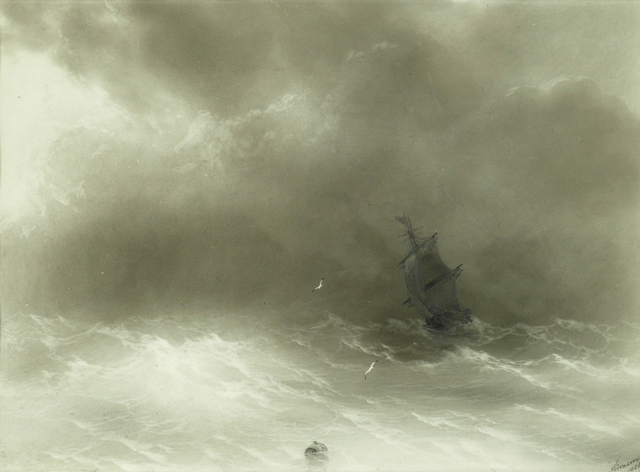Melville's "Mosses" - from an Old Mast
The actual title of the book is Billy Budd and Other Stories, published by Penguin Classics. However, there is such a similarity in the writing, I was reminded of the title of a Hawthorne collection, Mosses from an Old Manse. Since Hawthorne was the dedicatee of Moby-Dick and also referenced by name in one of these stories, I'm sure Herman Melville would take the comparison as a compliment!
Overall, I give the book 4 stars, but it's a mixed bag, so I'll review each story on its own:
Bartleby, the Scrivener
I really loved this story. It's probably the closest thing to Kafkaesque, pre-Kafka, that I've read. Bartleby is an enigmatic scrivener (copier - think Nemo from Bleak House), and it's hard to say if he's the hero or the antagonist, but he is certainly the mystery. I'm still not sure what to make of it, but it's one of those stories that is very good at painting atmosphere and the impression of things.
The Piazza
Another kind of mystery/word-painting...it seemed like this takes place in the Green Mountains in Vermont, though I'm not sure. It's about how the grass seems greener on the other side, but becomes less so the closer you see it.
The Encantadas
A whole set of sketches about the Galapagos Islands! In the middle of reading this, I rewatched Master and Commander: The Far Side of the World, so some of the places they visit finally "clicked" for me as I read about them in these stories. Some of the tales are purely descriptive, others are anecdotes, including "Sketch Eight: Norfolk Isle and the Chola Widow," about a woman who had "A heart of yearning in a frame of steel." Really great stuff, very thoughtful and often poetic.
The Bell-Tower
This was a strange story, more akin to a Doctor Who episode than anything else. What grabbed my attention was the fact that it was about a mechanical figure, practically a contraption, but Melville made you think it was as mobile as an (lowercase-a) android. Weird story.
Benito Cereno
To me, this was the dud of the group, which is unfortunate since it's the longest story. There was a lot of buildup and very little surprise in the plotline, and throughout, a lot of racist mentality coming from the main characters. By that, I don't even mean "ignorant prejudice" or "man of the times"; at least, it came across worse than that. Not much to recommend here on any front.
The Paradise of Bachelors and the Tartarus of Maids
Honestly (and after "Benito"), I had no idea what to expect with this one. It was excellent. This story contrasts two lifestyles - British bachelors in a prestigious club and New England single women working in a paper mill. If you want to know why Melville is a great author, you need only read "The Tartarus of Maids" and you'll understand. He conveys such a vivid scene through beautiful writing, ultimately to shock you with what reality was for someone who could have been you - "At rows of blank-looking counters sat rows of blank-looking girls, with blank, white folders in their blank hands, all blankly folding blank paper."
Billy Budd, Sailor
I knew this story from listening to a radio drama version many years ago. Still, there was so much in it that was thought- and question-provoking.
Billy Budd was an illegitimate child abandoned at birth, who later became a sailor on an English merchant ship, late 1700s. Though happy, content, and well-liked on his "home" ship, he gets suddenly impressed into the Royal Navy, taken onto a ship under a Captain Vere. Billy takes this in stride, cheerfully adapting to his new life and making no enemies of anyone - except, unbeknownst to him, a petty officer named Claggart. Claggart's dislike of Billy grows into hatred, and to the captain he takes his false accusation - that Billy is complicit in an imminent mutiny.
Wow...this story is like Moby-Dick in the sense that you could argue about it for hours. Not simply over the moral dilemma, but over the story itself. Why does Claggart persecute Billy? What were Vere's parting words all about? And what did the surgeon have to do with it anyway (if anything)?
One thing that bothered me was the long speech the captain gives. In it, he essentially says that, despite his belief in the ultimate Judge's vindication of the accused, martial law must be still followed under the extenuating circumstances. I find it difficult, especially in the context of a state (England) with a state church, that an authority figure would say "God will find him innocent" and "We need to dole out punishment" in the same breath. Poor writing, captain's paranoia, or what? I don't know. It's much more plausible to say "Let's make an example," which he indicates later on. That at least makes utilitarian sense, and it is either practicality or paranoia that drives the captain's reaction in this plot.
"Billy Budd" is a very good story, and I won't say anything more, except that I recommend it. Don't read the synopsis ahead of time, yet if you do, you will nonetheless empathize with the "Handsome Sailor," who never understood what happened to him. 5 stars.



Comments
And of course Bartleby is awesome. I've contemplated using his approach at my office a few times, but have never had the courage to actually try it. :-)